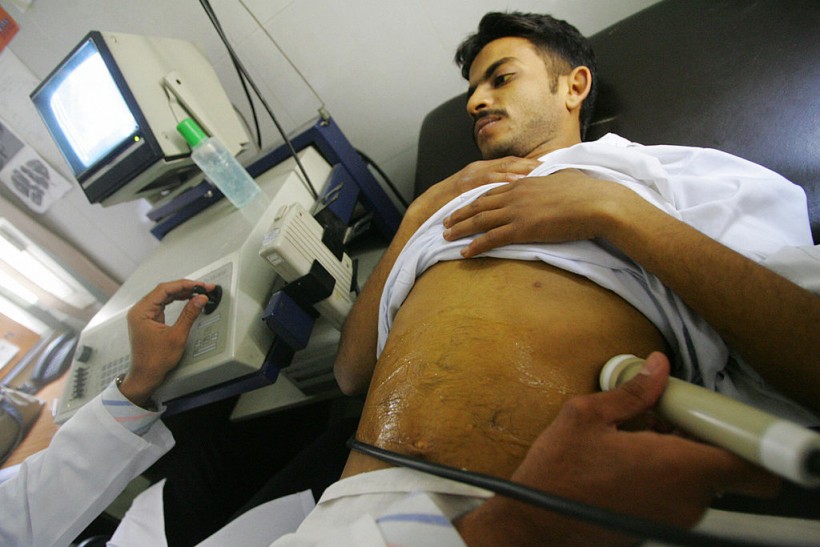Liver conditions often remain hidden as early symptoms are rare, leaving many unaware of their presence. Recent research presented at an Endocrine Society meeting in Chicago revealed that up to one in three adults may have an undiagnosed liver disorder, potentially elevating their risk of conditions like cardiovascular disease, cancer, or type 2 diabetes.
Non-alcoholic fatty liver disease (NAFLD) is one such condition, often associated with factors like obesity, elevated blood sugar, and high blood fat levels.

Cairo, EGYPT: TO GO WITH AFP ARABIC STORY BY SAFAA KANG An Egyptian doctor makes a medical examination on a liver patient in the hospital of the National hepatology and tropical medicine research institute in Cairo 18 June 2006.
Visible Signs of Fatty Liver Disease
Dr. Chun Tang, the medical director at Pall Mall Medical, noted that fatty liver disease often remains asymptomatic in its early stages and is typically discovered through routine medical check-ups or tests for other health concerns.
However, Dr. Tang highlighted several signs and symptoms that should raise concerns and prompt individuals to seek professional medical evaluation. These potential indicators encompass fatigue, abdominal discomfort, unexplained weight loss, and an enlarged liver.
Dr. Tang stressed that these symptoms are not exclusive to fatty liver disease and could be associated with various other health conditions. He advised anyone experiencing these symptoms or having risk factors for fatty liver disease, such as obesity, type 2 diabetes, or excessive alcohol consumption, to consult a healthcare professional for a comprehensive evaluation.
The diagnosis typically involves assessing medical history, conducting a physical examination, performing blood tests, and utilizing imaging studies like ultrasound or CT scans to evaluate the liver's condition and rule out other potential causes of liver issues.
In advanced stages, fatty liver disease, if not properly managed or treated, can progress to more severe forms like non-alcoholic steatohepatitis (NASH) and cirrhosis, which may manifest with more pronounced and serious symptoms.
These advanced symptoms can include the following:
- persistent and worsening abdominal pain
- jaundice
- ascites (abdominal swelling and discomfort)
- easy bruising and bleeding
- confusion and mental changes
- fatigue and weakness
- itchy skin
- spider veins
- skin changes
- gastrointestinal bleeding leading to black, tarry stools or vomiting blood
Individuals experiencing any of these symptoms should promptly consult with their GP.
READ ALSO: Non-Alcoholic Fatty Liver Disease is Causing Alzheimer's Disease, Medical Research Says
Is Fatty Liver Disease Reversible?
NAFLD is characterized by the accumulation of fat in the liver without organ damage. That means it can be reversed and that early intervention prevent more severe issues.
Weight loss is a crucial step in managing or reversing NAFLD, with research indicating that losing 10% of total body weight or even 3% to 5% can improve liver health. Consulting with a healthcare professional is recommended to determine the safest and most effective weight loss approach, which may involve dietary adjustments, exercise, weight loss surgery, or medication.
Addressing concurrent health problems linked to NAFLD is another vital strategy for reversing the condition. These associated health issues may include diabetes, high cholesterol, elevated triglycerides, sleep apnea, polycystic ovary syndrome, underactive thyroid (hypothyroidism), and underactive pituitary gland (hypopituitarism). Treating these conditions can contribute to NAFLD improvement.
Modifying your diet can have multiple benefits, such as promoting weight loss and enhancing overall health while reducing liver fat. Dietary changes include increasing fruit and vegetable consumption, incorporating more fish and high-fiber foods, limiting carbohydrates, sugar, saturated and trans fats, and reducing salt intake. Additionally, some research suggests that coffee consumption may help lower liver inflammation.
Lastly, it's essential to alleviate stress on the liver by avoiding alcohol, as it can lead to fat buildup and liver damage, particularly in individuals with NAFLD. Staying alcohol-free is recommended for those with this condition to protect liver health.
RELATED ARTICLE: What Are the Signs of NAFLD? If You Feel These Two Symptoms, Get in Touch With a Fatty Liver Disease Professional Today
Check out more news and information on Fatty Liver in Science Times.














